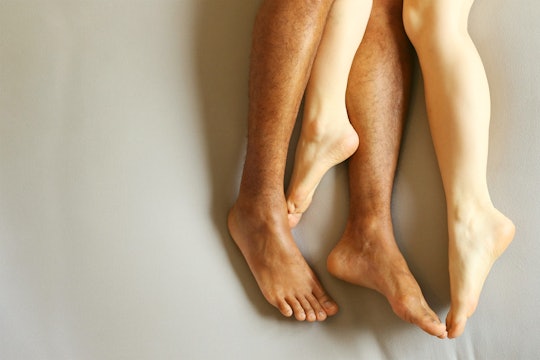Life

How To Help Yourself Get Pregnant Faster — Kind Of
Whether you're just starting on a journey to becoming a parent, or if you've been trying to start your family for a while and nothing has happened, you might be looking for a few tips on how to get this show on the road. So if you're wondering how to help yourself get pregnant faster, know that there are, in fact, a few tricks you can use to aid the process along. Well, sort of. Hey, science can be tricky, you guys.
The Bump explains how a few changes can actually help speed things up a bit. "The key to getting pregnant fast is not just about having sex at the right time but also about creating the perfect environment, so that when sperm meets egg, a healthy embryo grows into a healthy baby." Fair enough, so let's start with how to create that perfect environment and then move onto timing sex correctly.
Creating a hospitable environment for your future fetus starts with having a healthy lifestyle, so you'll want to do a few things to make sure you're in tip top shape. First, make sure you're getting regular moderate exercise and keeping your weight within a healthy range. NPR suggests women trying to conceive cut their caffeine intake down to about one 12-ounce cup a day and limit alcohol, sweets, and processed foods. Instead of indulging in the aforementioned, make sure you're eating lots of fruits and vegetables that can assist your body produce more fertility-friendly progesterone.
You're also encouraged to cut out smoking altogether, according to WebMD. And while you're at it, get your partner to quit as well, because smoking will lower the quality of his sperm. Stanford Children's Health reports that you can also start taking a pre-natal vitamin as soon as you start thinking about trying for a baby, because doctors report that the extra vitamins and folic acid are critical to baby's development at all stages of pregnancy.
Once you've checked off the items on your "womb-ready check list," it's time to work out the best timing for making that baby. According to BabyCenter, in order to have the best odds of sperm and egg meeting, you need to know when you're ovulating. The Bump explains that it can be a little tricky figuring out exactly when you're ovulating, though, reporting the following:
"It’s a common misconception that ovulation always occurs on the 14th day after your period starts, but that only happens if your menstrual cycle is consistent and 28 days long. But while the timing of ovulation depends on the woman’s unique cycle, all healthy women will get their periods 12 to 14 days after ovulation."
BabyCenter reports that your best bet for figuring out when you ovulate is to plug in your cycle and dates into an ovulation calculator. This will give you a range of a few days in the month when you'll be ovulating, and can even help predict how many days after your period you will ovulate each month.
Now, if you want to get even more specific (after all, we are trying to get pregnant faster here, folks), Cafe Mom says you can buy an ovulation predictor kit that will help pinpoint even more closely when you will be ovulating.
Since the woman isn't the only one whose parts are involved in creating a baby, you'll want to make sure your partner is doing his best to ensure that his sperm are ready as well. Similar aspects, like diet and exercise, apply to men as well as women, so involve your partner in your new trying to conceive routines. You might also suggest he pick up a few sets of boxers if he wears boxer briefs, since studies suggest keeping testicles cooler is paramount to good sperm production.
If you and your partner are under the age of 35, you can wait up to a year of actively trying to make a baby before seeing a doctor to find out of if there are any obstacles getting in your way, according to Parents. If you're over the age of 35, wait only six months of actively trying before seeing a doctor for some initial fertility testing.
Watch Romper's new video series, Romper's Doula Diaries:
Check out the entire Romper's Doula Diaries series and other videos on Facebook and the Bustle app across Apple TV, Roku, and Amazon Fire TV.